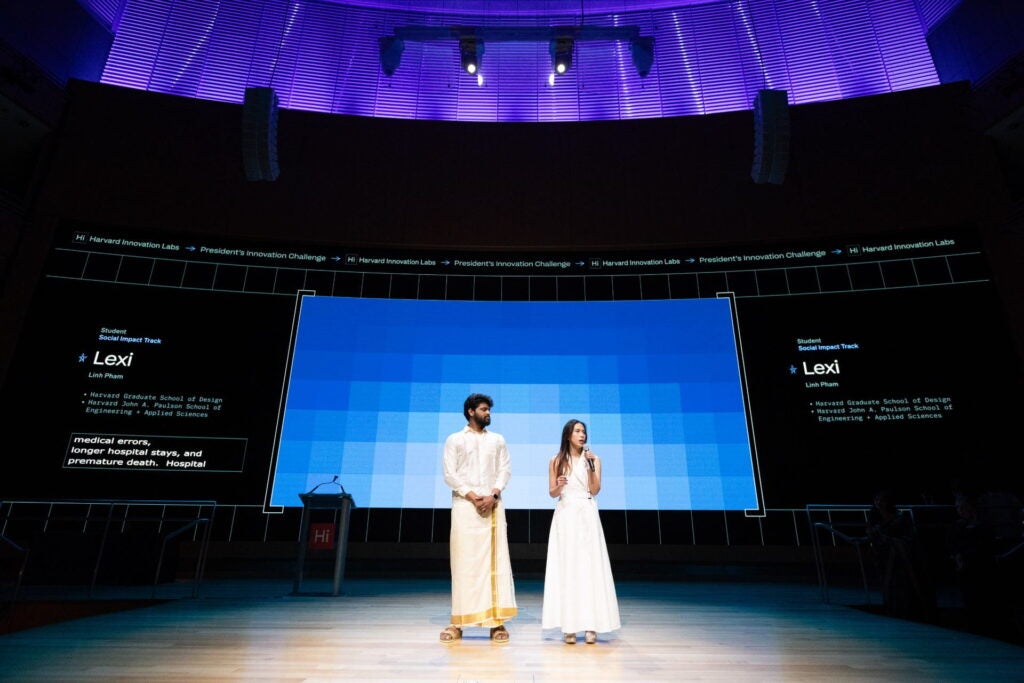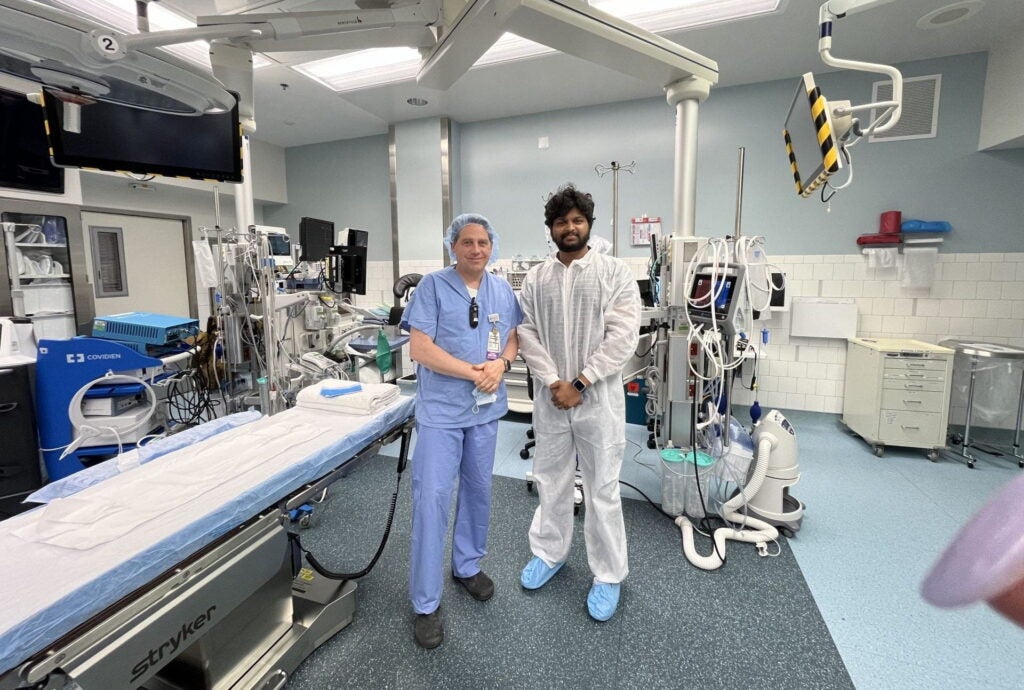Transcending the language barrier in healthcare: A Q&A with Siddharth UR and Linh Pham
The Harvard President’s Innovation Challenge is an annual competition for health care, social impact, and business ventures founded by Harvard students and alumni. Participants receive mentorship from the Harvard Innovation Labs (i-lab). Venture pitches are then vetted and finalists are selected to compete at the Harvard Business School’s annual New Venture Competition (NVC) which is open to all students and alumni of the University.
This year’s recipient of the Peter M. Sacerdote Grand Prize is Lexi, a venture aiming to break language barriers with AI-powered medical interpretation for over 30 million patients. FXB’s Director of the Program on Immigrants and Unhoused Communities Margaret (Maggie) Sullivan, FNP-BC, DrPH, FAAN, also provided mentorship to Lexi’s founders and sat down with two of them, Siddharth UR and Linh Pham, for a Q&A session a few weeks after the competition.
By Siddharth UR and Linh Pham
How Lexi came to be
Lexi began as a classroom project in the core studio of the Master’s in Design Engineering program at Harvard University, a joint program between the Harvard Graduate School of Design and the John A. Paulson School of Engineering and Applied Sciences, where Linh Pham, Siddharth UR, Daniel Rodriguez, and Jim Hansen teamed up to tackle the growing crisis of language access in healthcare. After completing the project in Spring 2024, Siddharth continued exploring the real-world need for such a tool during his summer fellowship at Mass General Brigham. That experience revealed the widespread communication gaps faced by providers, patients, and administrators alike.
Building on those insights, Linh and Siddharth chose to advance Lexi as their year-long thesis project. In Fall 2024, they joined forces with Jen Li (MBA 2025), Jared Gaffe (HLS 2026), and Linda Fei (SM 2025) through the “Innovating in Healthcare” course at Harvard Business School, where the team refined their venture.
Since then, Lexi, co-founded by Linh Pham and Siddharth UR, has grown into a multidisciplinary team spanning five Harvard schools and MIT. Together, they bring expertise across design, AI, clinical care, law, business, and regulation.
Over the past several months, the team launched Lexi’s MVP, began pilot deployments with leading health systems, and pioneered underserved language models like Haitian Creole through community partnerships.
In Spring 2025, Lexi was awarded the Grand Prize at the Harvard Business School’s New Venture Competition, received the Social Impact Fellowship Fund, and won the iF Gold Design Award, one of the most prestigious design honors in the world alongside Apple, Ferrari, and Sony.
Maggie Sullivan: Without a doubt, there is growing demand for language accessibility. In a world of multiple apps and interpretation services, how do you imagine Lexi to be unique or different from others?

Lexi is different because it’s purpose-built for healthcare. Most tools today are designed either for casual translation or generic transcription, they don’t capture the nuance, trust, and immediacy that medical conversations demand.
Lexi delivers real-time, voice-to-voice medical interpretation, fine-tuned for both medical accuracy and cultural sensitivity. We’re training our models on medical terminology and high-need, under-resourced languages like Haitian Creole and Vietnamese, languages most tools do not cater to.
We’re also co-developing Lexi with clinics and communities. It’s a tool shaped by people who’ve lived through these language barriers. Our focus is to make it ultra-easy for providers to use, integrated directly into their workflows, and most importantly, designed to restore dignity and clarity in care for patients who need it the most.
MS: Lexi is a social enterprise. What is the business case (i.e., return on investment) and what is the case for Lexi as a “social good” (improving accessibility for under-resourced organizations and communities)?
The business case is strong. Hospitals and clinics are spending millions on interpretation services each year, and still falling short. With Lexi, they can cut costs by over 50%, while improving compliance, efficiency, and patient satisfaction.
But the real power of Lexi is in its impact. In the U.S., 30 million people with limited English proficiency are more likely to be misdiagnosed, stay hospitalized longer, and pay thousands more for the same care. Language barriers are one of the most overlooked drivers of health inequity. We started Lexi because we have seen how language failures harm people we love. We are building a platform that works for communities, with communities, and keeps accessibility at the heart of every decision we make.


MS: In a time of increased surveillance and questions about privacy and confidentiality, especially among immigrant communities, what level of data security can Lexi provide? For those of us with minimal knowledge about technology, can you make an equivalent privacy and security comparison of Lexi to Signal, Jitsi, Proton, WhatsApp, etc.?
We understand that our users’ trust in Lexi does not just depend on its accuracy, but also on how safe it feels to use.
If you trust Signal for personal communication, Lexi offers similar privacy, as we use end-to-end encryption and do not collect metadata. Unlike all these communication services, Lexi is HIPAA-compliant, which is a strict U.S. health privacy law.
Patients and providers can trust that we don’t sell, share, or store sensitive information. In fact, we are even building features like re-translation and session logs to provide transparency and auditability, so providers know exactly what’s happening, and patients do not feel like they are being left out of their own care.
MS: What other question do you wish you’d get asked about Lexi, but rarely do?
We wish more people asked: “How does Lexi make patients feel?”
It’s not just about accuracy or speed. In our interviews, patients said Lexi made them feel seen and heard, especially when they recognized their own voice and tone reflected back through voice cloning. That emotional resonance helped build trust, reduce anxiety, and fostered a more human experience of care. For us, that’s everything.
Lexi’s Journey:
[All images and footage were provided courtesy of Lexi. The above represents solely the views of the authors and does not necessarily represent the views of the institution.]
Additional Reading
- Student ventures compete in Harvard President’s Innovation Challenge, Harvard T.H. Chan School of Public Health News, May 1, 2025
- 2025 Harvard Business School New Venture Competition: Students and Alumni Create Groundbreaking Solutions for the World’s Unique Challenges, Harvard Business School Press Releases, March 28, 2025

